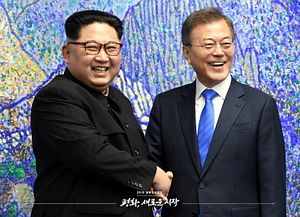The United States is increasingly concerned with South Korea’s apparent willingness to make economic concessions to North Korea before the Kim regime starts taking irreversible steps toward denuclearization.
In recent weeks, U.S. President Donald Trump has chided Seoul for suggesting that it might lift unilateral sanctions against its neighbor amid moves to revive commercial cooperation, and the U.S. Treasury has reportedly warned South Korean banks against renewing financial ties with the North.
South Korea – led by a pro-rapprochement president, Moon Jae-in – has sought to push for an easing of tensions on the peninsula through a charm offensive and confidence-building measures aimed at persuading North Korean leader Kim Jong Un to begin the denuclearization process.
Trump’s historic meeting with Kim in Singapore in June raised hopes that Pyongyang would begin to decommission its nuclear weapons in exchange for the lifting of U.S. and United Nations sanctions. Yet, since then, there have been few concrete signs that Kim is prepared to do so.
South Korea has insisted that it will respect the international sanctions regime, but in its haste to build bridges with the North it appears to have, deliberately or not, tested Washington’s patience.
The United States had been concerned that Kim’s decision earlier in the year to reach out to the South was designed to drive a wedge between Seoul and Washington. And, notwithstanding the fanfare around the breakthrough Singapore summit, the United States remains skeptical about Kim’s professed commitment to disarmament.
South Korean conservatives also have their doubts, but Moon seems determined to capitalize on the goodwill emanating from Pyongyang. Following North Korea’s surprise participation in the 2018 PyeongChang Winter Olympics, the peninsula’s leaders have had three high-profile meetings and signaled their readiness to cooperate on a number of fronts, most notably economic development.
In September, Moon led a business delegation to Pyongyang, comprising leaders of South Korean conglomerates. While the visit appears to have been more about public relations than a serious bid to explore possible investment deals, there have been serious discussions separately about reviving two commercial projects which were key elements of South Korea’s “Sunshine” engagement policy between 1998 and 2008.
Located just north of the Demilitarized Zone between the two countries, the Kumgang resort and the Kaesong factory complex promoted cooperation on tourism and industrial development, but their fortunes slumped when inter-Koreans tensions spiraled.
Over 2 million South Koreans reportedly visited Kumgang, which received substantial sums of southern investment. The flow stopped in 2008 when a tourist from Seoul was shot dead by a North Korean soldier for allegedly entering a restricted military zone. Kaesong, a hub for South Korean companies employing mostly North Korean workers, was shuttered in early 2016 following a rocket launch and nuclear test by the North.
At a meeting between Moon and Kim in September, their third summit this year, they agreed, among a number of measures, to “normalize” the two economic projects as soon as conditions allow and to start work on restoring road and rail links, severed since Korean War, between the two countries. At a subsequent meeting in October the two Koreas also agreed to break ground on the transport project later this month or early in December.
While Kim again made positive noises about denuclearization at the September summit, there was little in the way of solid declarations to that end. Moon’s willingness to offer what appeared to be sanctions concessions raised questions about his adherence to the U.S. policy of exerting “maximum pressure” to get the North to dismantle its nuclear arsenal. Some reports have suggested that South Korea would require exemptions from UN, and possibly U.S., measures against the North to proceed with the joint economic projects.
The decision to go ahead with plans to reconnect transport infrastructure in particular is likely to have raised red flags in Washington, coming as it did just a week after Trump responded tersely to South Korean Foreign Minister Kang Kyung-wha’s disclosure that Seoul was considering lifting some of its unilateral sanctions against the North. While the move would appear somewhat symbolic, as many of the restrictions are duplicated by international measures, it nonetheless underlines the South’s eagerness to offer Pyongyang economic carrots.
The U.S. president, though, made it plain that any relaxation of sanctions could only be done with Washington’s consent. “They won’t do that without our approval. They do nothing without our approval,” Trump is reported to have said. That, together with criticism of Kang’s remarks by opposition lawmakers in Seoul, seems to have prompted an official retraction, with the South’s Unification Minister Cho Myoung-gyon subsequently confirming that there would be no move on sanctions relief for the North.
Further signs of Washington’s alarm at the zealousness of Seoul’s overtures toward its neighbor emerged in late October. Reuters cited U.S. Treasury reaction to reports suggesting the resumption of financial cooperation between the two states.
The news agency said that a South Korean regulatory document, parts of which were released by a Seoul opposition lawmaker, included an official from the U.S. Treasury’s Office of Terrorism and Financial Intelligence expressing “deep concern” that South Korean banks had misunderstood their duties “to comply with UN and U.S. financial sanctions on North Korea.”
Washington clearly believes that Seoul is sailing close to the wind in its attempt to woo Pyongyang. While better relations between the long-estranged neighbors are to be welcomed, there is a danger that, in overplaying its hand, South Korea will prolong the North’s vacillation over denuclearization while at the same time raising its expectations on sanctions relief.
That could bring about Washington’s fear of Pyongyang sowing divisions between South Korea and the United States. Both must work in lockstep to facilitate disarmament in the North. Failure to do so threatens to torpedo Kim’s ostensible commitment to the goal, arguably Trump’s biggest and only foreign policy achievement to date.
Yigal Chazan is Head of Content at Alaco, a London-based business intelligence consultancy.

































